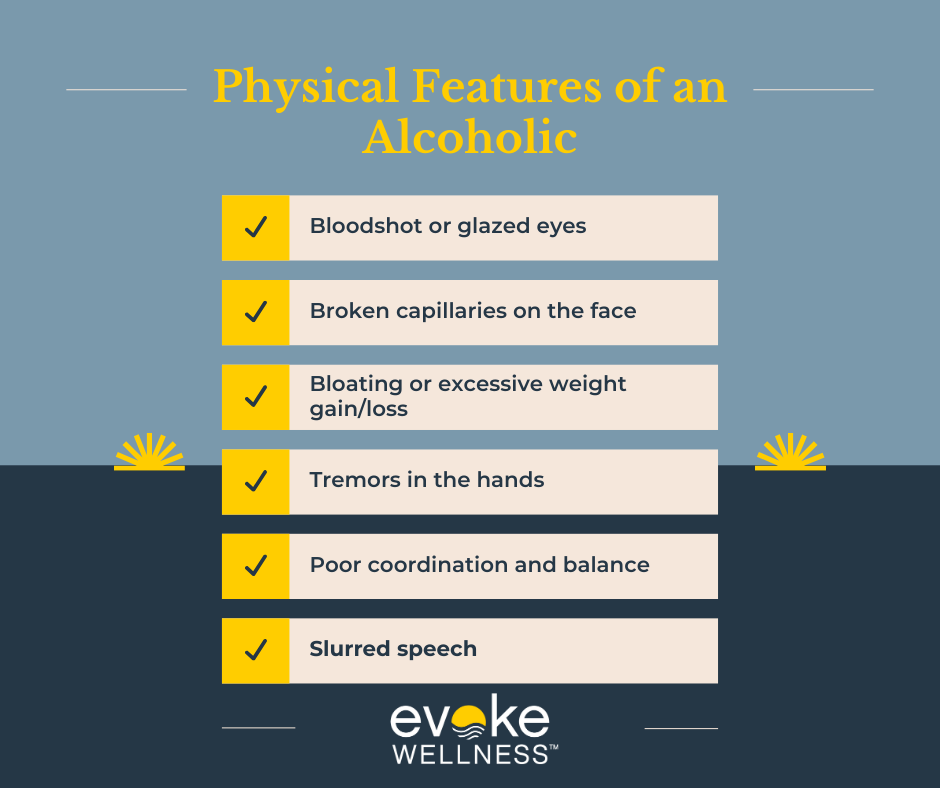Are you concerned about a loved one’s drinking habits? Recognizing the physical signs of alcoholism can be crucial in identifying a problem and seeking help. While not everyone experiences the same symptoms, there are common physical features that may indicate alcohol addiction. This article will explore the telltale signs to watch for, backed by recent studies and statistics. You’ll learn about the visible effects of long-term alcohol abuse on the body and how these changes can impact overall health. We’ll also discuss treatment options, including alcohol addiction programs, detox, residential care, and therapy for those struggling with alcohol or polysubstance abuse. Understanding these physical markers is the first step in addressing alcohol dependency and starting the journey to recovery.
Together, let’s embrace the journey to recovery and the promise of a new beginning. Call us at (617) 917-3485 today or reach out online.
The Physical Signs of Alcoholism
Recognizing the Indicators
Alcoholism, a chronic brain disorder, manifests itself in various physical signs and symptoms. As alcohol addiction progresses, individuals may experience increased tolerance, requiring higher amounts to achieve the desired effects. This can lead to prioritizing drinking over other interests and neglecting responsibilities.
Outward Appearances
Visible signs may include:
- Flushed or reddened complexion
- Poor hygiene and unkempt appearance
- Tremors or shakiness, particularly in the morning
- Slurred speech and impaired coordination
Internal Effects
Internally, alcohol takes a significant toll, causing damage to vital organs like the liver and brain. Other physical signs can include:
- Frequent nausea or vomiting
- Unexplained weight loss or gain
- Sleep disturbances and fatigue
- Frequent headaches or blackouts
Withdrawal Symptoms
As alcohol dependence deepens, attempting to quit can trigger severe withdrawal symptoms, such as:
- Profuse sweating and rapid heartbeat
- Anxiety, irritability, and mood swings
- Hallucinations or seizures in extreme cases
These signs underscore the importance of seeking professional help from addiction treatment programs like Evoke Wellness at Cohasset. Their comprehensive approach, including medically-assisted detox, therapy, and aftercare support, can guide individuals safely through recovery.
Physiological Changes
The physiological effects of alcoholism can manifest in visible changes to one’s appearance and overall health. As the body attempts to process excessive alcohol intake, it undergoes various alterations that serve as warning signs of a deeper issue.
Facial Redness and Vascular Changes
- One of the most noticeable signs is a persistent reddening of the face, often referred to as a “drinker’s flush.” This condition results from the dilation of blood vessels near the skin’s surface, causing increased blood flow and redness.
- Prolonged alcohol abuse can also lead to the development of spider veins or thread veins, which are small, visible blood vessels that appear on the face, neck, and other areas of the body.
Swelling and Puffiness
Excessive alcohol consumption can cause fluid retention and inflammation, leading to a puffy or bloated appearance, particularly in the face and around the eyes. This puffiness is often accompanied by weight fluctuations and a general unkempt appearance due to neglect of personal hygiene and self-care.
Weakened Immune System
Chronic alcohol abuse takes a toll on the body’s immune system, making individuals more susceptible to frequent illnesses and infections. Prolonged heavy drinking can weaken the body’s ability to fight off common illnesses, leading to a cycle of poor health and increased vulnerability.
While these physiological changes may seem superficial, they are often indicative of more severe underlying health issues associated with alcoholism. Seeking professional help from addiction treatment programs, such as those offered at Evoke Wellness, can provide the necessary support for recovery and address the root causes of alcohol dependence.
Psychological Changes
The chronic use and abuse of alcohol can profoundly impact a person’s psychological well-being, leading to a range of cognitive and emotional impairments. As alcoholism is a chronic brain disease, it can significantly alter an individual’s thought processes, moods, and behaviors over time.
Personality Shifts
One of the most evident psychological changes in individuals struggling with alcoholism is a noticeable shift in their personality. They may prioritize drinking over other responsibilities, abandon previously enjoyed activities, and exhibit irritability, mood swings, and general personality changes when not drinking. This can strain relationships, impair job performance, and contribute to social isolation.
Emotional Distress
Alcohol abuse can also exacerbate or contribute to the development of various mental health issues, such as depression, anxiety, and emotional instability. Individuals may experience an overwhelming craving or urge to drink alcohol, leading to a negative emotional state when not using. This emotional distress can create a vicious cycle, where individuals turn to alcohol to cope, further perpetuating the addiction.
Cognitive Impairments
Prolonged alcohol abuse can have detrimental effects on cognitive functioning, including impaired memory, decision-making abilities, and concentration. These deficits can make it challenging for individuals to recognize the extent of their problem, seek help, or engage in effective treatment strategies.
Addressing the psychological aspects of alcoholism is crucial for achieving long-term recovery. Evoke Wellness at Cohasset offers evidence-based therapies, such as cognitive-behavioral therapy (CBT) and dialectical behavior therapy (DBT), to help individuals develop healthier coping mechanisms, improve emotional regulation, and prevent relapse. By providing comprehensive psychological support alongside medical detox and residential treatment, individuals can regain control over their lives and overcome the psychological challenges associated with alcohol addiction.
Biological Changes
Early Signs
As alcohol consumption increases, your body begins to exhibit noticeable physical changes. One of the earliest signs is the premature development of wrinkles and fine lines. Alcohol dehydrates the body, depleting it of vital nutrients and causing skin to lose elasticity. Additionally, your hair and nails may become dry, brittle, and prone to breakage due to nutritional deficiencies.
Visible Effects
With prolonged alcohol abuse, more pronounced biological changes occur. Your skin may take on a yellowish tint, known as jaundice, indicating liver damage. This discoloration is caused by the buildup of bilirubin, a waste product normally processed by a healthy liver. Persistent alcohol use can also lead to weight gain, particularly around the abdomen, as alcohol disrupts the body’s ability to metabolize and store fat effectively.
Internal Damage
While some changes are visible, alcohol addiction can also cause severe internal harm. Excessive drinking can lead to liver cirrhosis, a condition where healthy liver tissue is replaced by scar tissue, impairing the organ’s ability to function properly. Alcohol consumption has also been linked to an increased risk of certain cancers, such as liver, breast, and colorectal cancer.
Seeking Treatment
If you or a loved one is experiencing these biological changes due to alcohol addiction, it is crucial to seek professional help. Comprehensive treatment approaches, including detoxification, residential treatment, therapy programs, and ongoing support, can help address the physical and psychological aspects of alcohol addiction, promoting lasting recovery and improved overall health.
Alcohol Addiction Treatment in Cohasset, Massachusetts
Overcoming alcohol addiction requires professional support and evidence-based treatment. In Cohasset, individuals struggling with alcohol use disorder can access comprehensive care through residential and outpatient programs tailored to their unique needs.
Personalized Treatment Plans
Top-rated addiction treatment centers offer personalized plans that address the physical, psychological, and social aspects of alcohol dependence. These plans may include:
- Medically supervised detoxification to manage withdrawal symptoms
- Behavioral therapies like cognitive-behavioral therapy (CBT)
- Holistic healing approaches like mindfulness and experiential therapy
- Family counseling and education programs
Luxury Accommodations and Amenities
Many Massachusetts treatment facilities provide upscale living quarters and recreational amenities to promote a nurturing environment for recovery. These can include:
- Private rooms and suites
- Gourmet dining with nutritious meal plans
- Relaxation spaces like pools, spas, and meditation gardens
- Fitness centers and outdoor activities
Aftercare and Alumni Support
Reputable addiction treatment centers understand that recovery is an ongoing journey. They offer aftercare planning and alumni support services to help individuals maintain sobriety, such as:
- Sober living housing and transitional support
- Ongoing individual and group therapy
- Alumni community events and peer support networks
By choosing a comprehensive alcohol addiction treatment program in Massachusetts, individuals can embark on a transformative path toward lasting recovery in a serene, supportive setting.
Physical features of an alcoholic | FAQ
An alcoholic develops physical tolerance, requiring larger amounts of alcohol to achieve the desired effects. Physical dependence results when stopping can trigger withdrawal symptoms.
Long-Term Health Impacts
Prolonged heavy drinking takes a major toll on nearly every organ system. Some potential consequences include:
- Liver disease, including cirrhosis
- Increased cancer risk (mouth, throat, liver, colon)
- Heart problems like cardiomyopathy
- Brain deficits and neurological damage
- Weakened immune system
Functional alcoholics still face these risks despite appearing to maintain their lives. Early intervention is crucial.
Overcoming Physical Dependence
For many alcoholics, medically-supervised detox is needed to manage potentially dangerous withdrawal symptoms. Options like medication-assisted treatment can ease cravings and side effects.
Inpatient or outpatient rehab programs provide counseling, therapy, nutritional support and other services. Ongoing aftercare helps prevent relapse by addressing the physical, mental and emotional aspects of alcohol addiction.
Conclusion
In conclusion, recognizing the physical features of alcoholism is crucial for early intervention and treatment. By understanding these signs, you can take proactive steps to address alcohol addiction in yourself or a loved one. Remember that professional help is available through comprehensive programs like those offered at Evoke Wellness at Cohasset. Our evidence-based approaches include alcohol addiction treatment, drug and alcohol detox, residential treatment, polysubstance addiction treatment, and various therapy programs. Don’t let the physical toll of alcoholism progress further – reach out for support today. With proper care and commitment to recovery, it’s possible to overcome alcohol addiction and regain your health and well-being.
Begin Your Journey with Evoke Wellness at Cohasset
If you or a loved one is considering treatment, Evoke Wellness at Cohasset invites you to contact us. Our compassionate team is ready to answer your questions, discuss your needs, and help you take the first steps toward recovery. In Cohasset, you’ll find more than just a treatment program – you’ll discover a community dedicated to your wellness and success. Together, let’s embrace the journey to recovery and the promise of a new beginning. Call us at (617) 917-3485 today or reach out online.





